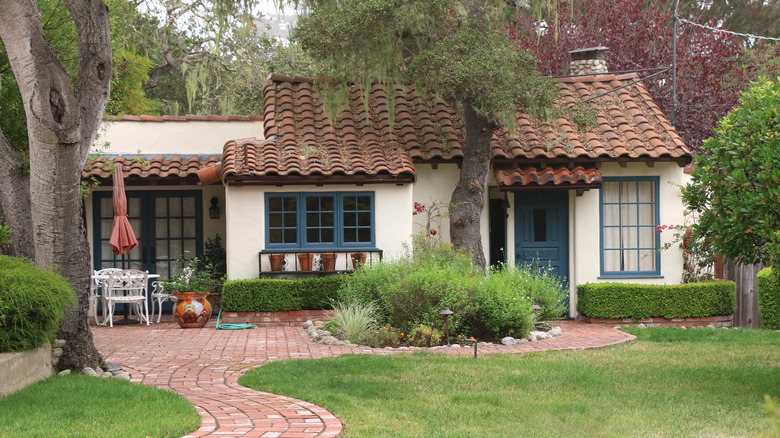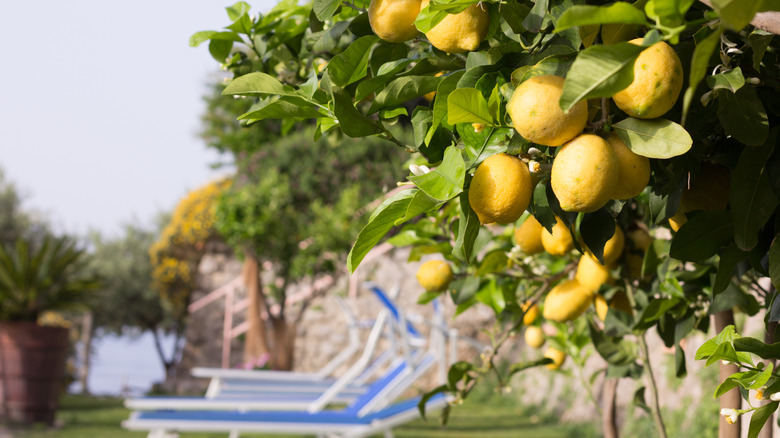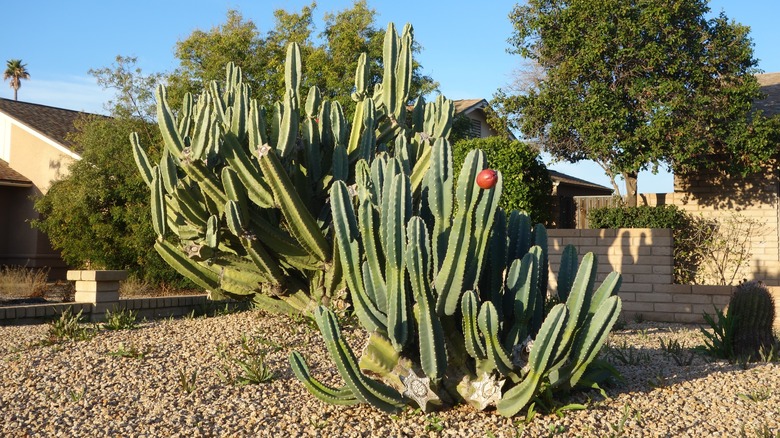Plants To Add To Your Garden If You Want It To Transport You To Spain
Homes that are designed with Spain in mind often feature tall stucco (usually white) exteriors, lots of archways, clay tile roofs, and accents in dark wood and wrought iron that are a stark contrast against the pale walls gleaming in the sun. Beyond these aesthetic details, however, one hallmark of a Spanish-style home is its courtyard and landscaping. The outdoor space is just as much of a part of the living area here as the Mediterranean décor interiors are, so it's important to cultivate the perfect garden. And if you'd like to keep your courtyard and garden as reminiscent of the Spanish countryside as the rest of your home, there are some plants you simply must include, such as fruit trees, desert palms, and succulents.
Spain enjoys a Mediterranean climate in its coastal regions bordering the Azure Sea, while its large central plain experiences a more Continental climate. These two weather patterns are both characterized by arid summers with high temps, so the kinds of plants that will flourish here like a lot of sun and are drought resistant, generally hardy in USDA zones 8-10. Plant the following plants in your garden and transport your outdoor space all the way to the Iberian Peninsula.
Fragrant herbs and fruit trees
Two things the Mediterranean region is known for are fragrant herbs and fruit trees. These fresh, natural ingredients are often used in cuisine from the region, making it loved by people worldwide. Consider herbs with visual interest as well as enticing aromas. Lavender, rosemary, and oregano are all drought-tolerant herbs that love the sunlight, and while lavender is mostly used as an aromatic, the others are regularly part of Spanish cuisine, in addition to different varieties of peppers. These plants are also very versatile in that they can be cultivated in the ground or in a container garden.
In this same vein are the wonders of fruit trees, particularly citrus. With their bright colors and sweet smells, citrus trees are as much of a favorite of Spanish gardens as their flavors are in their cuisine. Generally considered hardy in zones 9-11, citrus trees are a beautiful and bountiful addition to a Spanish-inspired courtyard, but the type of citrus you grow does depend on how cold your winters get. Limes are most susceptible to cold temperatures, with lemons also succumbing to frosts quite easily, so if those are a regular occurrence each year, consider mandarins or kumquats, which are much more tolerant to a string of low temperatures.
Desert palms and succulents
As far as hot, arid climates go, desert plants like palm trees, succulents, and cacti are abundant, and this is certainly true in Spanish homes and gardens too. Spain is actually home to Europe's largest palm grove, Palmeral de Elche in Valencia. You won't be able to recreate an orchard of over 200,000 palm trees in your yard, but a few standout species could recreate the effect of a Spanish courtyard. Try the palmito, also known as the Mediterranean or European fan palm, the only native palm of the Spanish island of Mallorca. Its aptly named fronds and many trunks are both a classic and unique image of the traditional palm tree.
Succulents like yucca and other cacti are also native to the Iberian Peninsula where Spain sits geographically. These desert plants have specially adapted to the dry, hot summers and store water in their fleshy leaves. Desert City is a botanical garden in Madrid featuring over 400 species of cacti in the middle of the national capital. The giant Saguaro cactus might be too large for your yard with its average maximum height of 50 feet tall, but the tiny Blossfeldia certainly isn't. Sizes range everywhere in between too. Try a prickly pear, Peruvian apples, or even the yucca variety Spanish bayonet, with its pollinator-pleasing flowers, to brighten up your yard and transform your garden into a hacienda paradise.


